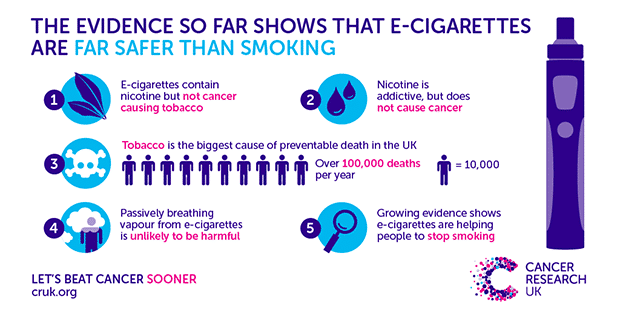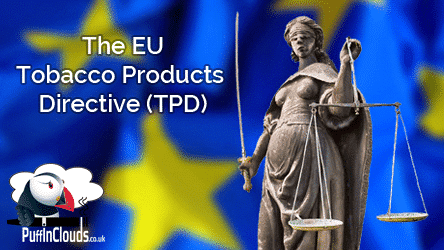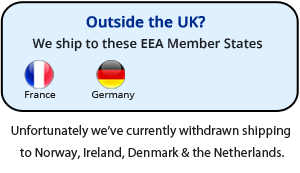
New study comes the closest yet to proving that e-cigarettes aren’t as dangerous as smoking
e-cigarettes aren’t as dangerous as smoking: It’s just over a decade since e-cigarettes first hit the shelves. And since then there’s been an explosion in their popularity, with almost 3 million adults using them in Great Britain today.
But this rapid popularity, and the potential these devices hold to help people stop smoking, has left some challenges. The biggest being that research looking at their safety has struggled to keep up.
Many studies have shown that e-cigarettes appear to be far safer than smoking. But there’s still a big misconception that e-cigarettes are as harmful as smoking, and that could be stopping smokers who might benefit from switching to them.
Now a new study from a team of our scientists at UCL helps put to rest these fears. And depending on how you define ‘long-term’, the findings are the most convincing evidence to date that e-cigarettes are far safer than smoking.
E-cigarettes should be far safer than smoking
Tobacco is the world’s leading cause of preventable death, accounting for around 6 million deaths each year. That’s thanks to the cocktail of over 5,000 chemicals in cigarette smoke, of which at least 70 may cause cancer.
E-cigarettes, on the other hand, do not contain tobacco. Instead, they carry a nicotine-containing liquid which is heated into a vapour and breathed in. The nicotine satisfies the cravings associated with a smoking addiction, but doesn’t cause cancer.
The fact that e-cigarettes don’t produce tobacco smoke and the countless chemicals found within it has always suggested that these devices should be safer than smoking. But when they first came to the market, there wasn’t enough research to be sure of this. This is why scientists around the world have sought to understand what’s in e-cigarettes and what the impact of these products might be.
Early studies looking into this showed that e-cigarette liquids, and the vapour they produce, don’t contain the same level of most toxic chemicals as tobacco cigarettes. In fact, these levels have been found to be so low that Public Health England and the Royal College of Physicians estimate that e-cigarettes are ‘around 95% safer than smoking’.
But, until now, nobody had looked at what everyday users are actually exposed to in the real-world.
So the study out today, led by Dr Lion Shahab, is the first to look at the effects of e-cigarettes in what they define as ‘long-term users’.

Just how safe are they?
The study included a group of e-cigarette users, who had been using them for an average of around 17 months, and measured the levels of nicotine and 26 potentially harmful chemicals in their body, by looking at samples of their urine and saliva.
The team compared the results to cigarette smokers, and people who both smoked and used e-cigarettes. They also looked at people who used nicotine replacement therapy (NRT), which is commonly used to help people stop smoking or as a long-term alternative.
“We looked at NRT users because we know these products are safe to use,” says Shahab. “We thought they would be a good comparison,” he adds, because long-term users get their nicotine hit from a smoke-free source, much like e-cigarette users.
Interestingly, the nicotine levels found in the samples from e-cigarette users were very similar to those who used NRT and to smokers. This suggests that people are able to satisfy their nicotine cravings through using either of these products.
The full benefit of using e-cigarettes is from completely stopping smoking
– Dr Lion Shahab, UCL
“Part of the reason why people use e-cigarettes is to stop smoking, and we have shown that they provide effective delivery of nicotine,” says Shahab.
But the key finding came when the team looked in the samples at the levels of potentially toxic chemicals. They found that there was a remarkable difference in the levels of these substances between the different groups. In fact one chemical, called NNAL (known to cause lung cancer), was 97% lower in e-cigarette users compared to smokers.
Not only did e-cigarette users have lower levels of these substances compared to smokers, but they were also found to have very similar levels to people using NRT – something that Shahab is quick to point out is known to be relatively safe.
“We have 3 decades of research into the safety of NRT, and we’ve not picked up any significant long-term health issues,” he says.
So if e-cigarettes have the same effect on the body as an established stop smoking treatment, then surely we can assume that these products are relatively ‘safe’ too? While nothing can ever be considered completely safe, we can compare it to the other things we experience in our day to day lives.
We still need to be cautious about e-cigarettes
Unfortunately, we’re not 100% convinced yet. There are a number of points left to uncover that this study hasn’t yet answered.
The first is that people who used e-cigarettes while still smoking didn’t reduce the levels of toxic chemicals they were exposed to. And a large number of e-cigarette users do still smoke.
“The full benefit of using e-cigarettes is from completely stopping smoking,” says Shahab. “Any health benefits come from dramatic reductions in these chemicals, and we’re not seeing this in people that use both e-cigarettes and combustible cigarettes.”
And although this study found significantly lower levels of these substances in vapers than smokers, the chemicals are still there.
The study didn’t compare the levels of chemicals in people who don’t smoke or use e-cigarettes with those who do, so it’s not known what the differences are likely to be. If these chemicals are found to be at higher levels in people who use the devices there’s still a chance that some harm is being done.
According to Shahab the next step is to look for signs of damage in these different groups of people, instead of looking at levels of chemicals that cause harm. But it can take decades to see these differences.
We also know that different users use different devices and liquids. So it could be that some are safer or more harmful than others. And people also use the devices in different ways. So further work needs to be done to understand these differences, so that each vaper is using their device as safely as possible.
We intend on playing a key part in finding these answers. And that’s why we set up the UK E-Cigarette Research Forum, made up of the country’s top tobacco and e-cigarette researchers, to do exactly that.
What does this mean right now?
This study confirms that e-cigarettes are far safer than smoking. If you’re a smoker, the best thing you can do for your health is to stop. And the most effective way to do so is through free Stop Smoking Services.
And as we’ve written about previously, a number of successful quitters have managed to ditch the cigs through using both an e-cigarette and specialist support.
But this doesn’t mean that e-cigarettes are entirely without harm. If you’re a non-smoker, it’s not advisable to start vaping. We can’t yet be certain of all the long-term effects across all devices and liquids, so it’s best not to pick up the habit.
So although it’s unlikely e-cigarettes will be shown to be completely harmless (nothing ever is), today’s results are a landmark moment in showing just how much safer they are than smoking.




